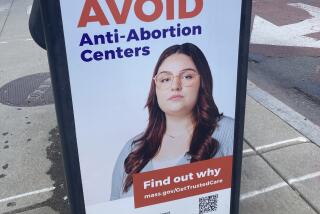Two Christian Advocacy Groups Put Faith in Courts
SAN FRANCISCO â When a severely disabled Miami woman was raped and impregnated, Florida-based Liberty Counsel stepped in, attempting to block an abortion and seek guardianship of the fetus.
When a Huntington Beach ministry was booted from the warehouse where it worshipped and wound up in a dirt lot, the Arizona-based Alliance Defense Fund swiftly filed suit, arguing that the city had violated the federal religious land-use act.
Now, the two groups are suing to block San Franciscoâs same-sex marriages, an issue that will almost surely land before the state Supreme Court. They are part of a growing Christian legal advocacy movement bent on enhancing the rights and promoting the moral visions of evangelical Christians in the public sphere.
Both groups have defended the right of Christian public school students to express their views and to have access to school funds and meeting space. Both have fought on behalf of antiabortion protesters. Both increasingly have battled laws that offer benefits to gays and lesbians.
There is no shortage of sniping between the two: They woo the same donors and have jockeyed for top billing on key California cases. Each lobs mild insults at the other.
Funded by prominent conservative Christian ministries, the organizations so far have met mixed results in the courts. In San Francisco, each group has separately gone to court to block same-sex weddings, adopting slightly different legal arguments. Neither has succeeded so far.
But supporters and critics alike say the two groups are a force to be reckoned with, as common in the courtroom as the secular civil libertarians and gay rights groups they seek both to imitate and counter.
âThe American Civil Liberties Union and the alphabet soup of other organizations on the other side of these issues were in court for a generation before people of faith woke up and decided we needed to appear,â said Alan Sears, the Alliance Defense Fundâs president and general counsel and a former federal prosecutor. âThe other side attacked first. They hit and they hit and they hit, and finally weâre defending.â
âWe found,â said Liberty Counsel founder Mathew Staver, âthat you could pass all the laws you wanted to, but then the courts would strike them down.â
Staver was a young Seventh-day Adventist preacher when he watched a video on abortion and realized that âlaw could be beneficial to faith.â He founded Liberty Counsel in 1989 and forged a close alliance with the Rev. Jerry Falwell.
At Staverâs urging, Falwell is opening a law school at his Liberty University in Lynchburg, Va., along with a Center for Constitutional Litigation and Policy where Liberty Counsel will operate. Staver is a Liberty University trustee and serves as chairman of the law school steering committee.
Staver quickly learned that the main weapon in the arsenal of secular civil libertarians -- the 1st Amendment -- could serve his purposes in protecting freedom of religion.
Now, he says, the fight to preserve traditional marriage is ultimately a free speech issue as well.
âThereâs a desire to criminalize and take away freedom of speech of people like me who think homosexuality is wrong and traditional marriage is the model,â he said.
The Alliance Defense Fund followed a different trajectory. Backed by well-known conservative ministries, including Focus on the Family, Campus Crusade for Christ and Coral Ridge Ministries, it was launched with fanfare at a national convention of religious broadcasters in late 1993.
A coalition of nearly three dozen member organizations with shared ideology, the group aimed to raise millions of dollars for grants to support key litigation carried out by others. Its goal: âto keep the door open for the spread of the Gospel.â
The group has tapped hundreds of evangelical Christians already practicing law across the country as a kind of farm team. In exchange for all-expense-paid training at hotel seminars, the lawyers work at least 150 pro bono hours on Alliance-funded cases.
About two years ago, the group hired staff attorneys to directly litigate cases âthat will have lasting national precedent,â Sears said.
The organizations have secured important victories in cases where religious clubs or newspapers sought the same type of public school funding or access to meeting space that secular groups receive, said University of Texas Law School professor Douglas Laycock, who has taught at Alliance seminars.
In some cases, the groups take positions the ACLU endorses. Many successful cases have involved situations where schools deny a student the right to distribute religious literature, pray or express beliefs in a setting not sanctioned by the school.
Liberal critics, however, say that in some cases, the groups exaggerate minor victories.
âThey do a lot of no-brainer cases where some school has made an obvious error, that even I would agree they shouldnât have made. Then they go in and file a lawsuit and prevail and claim theyâve won this great victory,â said Barry Lynn, executive director of Americans United for Separation of Church and State.
Both organizations have branched out into land-use issues. Among the victories Staver counts is a 2002 case from Virginia where the group successfully challenged a provision of the state constitution preventing churches from incorporating.
The Allianceâs Huntington Beach case, filed in federal court on behalf of Praise Christian Center, is among several pursued by the groupâs California counsel, Robert H. Tyler. He argues that the city has violated the federal religious land-use law, which prevents local government from imposing âsubstantial burdensâ on religious groups.
To their critics, the groupsâ commitment to the First Amendment and other constitutional protections is focused too narrowly on their own ideological goals.
Florida ACLU Executive Director Howard Simon said Liberty Counsel, for example, has been absent from a case involving the right of observant Muslims to obtain driverâs licenses without photos.
The group also has stayed out of one of Floridaâs largest religious liberty cases -- now before the state Supreme Court -- involving the right of families to maintain upright religious symbols at a municipal cemetery, he said.
âThey make the claim that they are an organization out there defending religious freedom. But they are both selective and totally disingenuous about that,â Simon said. âWhat they are about is trying to marry government policy to their narrow religious views and coerce everybody else to live by that.â
Staver said he believed the Florida driverâs license law could not be successfully challenged. His group has filed a brief in support of the ACLUâs position in the cemetery case, he said.
Simon and other critics also say the groups have been inconsistent in the way they approach the First Amendment.
Staverâs group has argued for the right of government officials to display the Ten Commandments, for example, arguing that the display did not violate the Constitutionâs ban on government establishment of religion.
At the same time, he also threatened to sue a Florida public library for handing out Harry Potter witchcraft certificates, saying the cityâs action did violate the establishment clause by promoting witchcraft as a religion.
Critics of Staverâs group also say that ideology at times outweighs legal acumen. A case in point: the attempt to be named guardian of the disabled Miami rape victimâs fetus, the womanâs attorney said.
âThere was no legal basis for it, and they didnât file anything which would have steered a judge away from the existing precedent,â said Lance Block, who last year prevailed on behalf of the 28-year-old woman.
The gay- and lesbian-linked issues in California have underscored tensions between the organizations.
Staver said his group was prepared to file first in a domestic partner case last year, but delayed as a courtesy to the Alliance Defense Fund. In same-sex marriage cases, Staverâs organization rushed into court first. But the group was rebuffed because it did not give proper notice to city officials. Meanwhile, the Alliance Defense Fund filed its lawsuit and received the first hearing.
Staver said many of the cases claimed by the Alliance Defense Fund website as victories for the organization are Liberty Counsel cases or cases litigated by organizations that received only a small grant from the alliance.
The Alliance Defense Fund pointed its own barb in Staverâs direction, when chief counsel Benjamin Bull called some of the fundâs work in the San Francisco case lacking.
Staver conceded that because of the fast-moving nature of the case so far -- hearings have been held on short notice -- the work âisnât necessarily the best quality work that either side has done.â But he remains optimistic the groups can prevail once the matter goes before a trial court.
Jon Davidson, a senior lawyer for Lambda Legal, which defends gay rights cases across the country, said the multiple lawsuits and emergency hearings have kept gay and lesbian advocates jumping.
âWe have tried not to have our agenda dictated by them,â he said, âbut they are keeping us fairly busy.â
More to Read
Sign up for Essential California
The most important California stories and recommendations in your inbox every morning.
You may occasionally receive promotional content from the Los Angeles Times.











